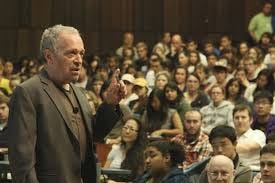Robert Reich,
I’m worried about my children. Not my biological ones — they’re fine — but my students, whom I think of as my children because I have taught them and counseled them and nurtured them for years.
They are at a time of their lives when they’re trying to figure out the meaning of social justice and their roles in seeking to advance it.
Yet some of them who are Jewish tell me they’re afraid.
Some who are Arab or Palestinian or Muslim tell me they’re afraid, too.
The two groups are afraid of each other. There have been perceived threats, slights, intimidation.
My Jewish students tell me of receiving antisemitic notes, of seeing swastikas, of feeling unsafe.
My Arab, Palestinian, and Muslim students tell me that speaking out against Israel’s aggression has resulted in “doxing,” and in some cases withdrawals of offers of employment. They are subject to anti-Palestinian and Islamophobic taunts. They also feel unsafe.
Here’s what I’m telling them in response.
First, if Jews and Palestinians, Arabs, and Muslims on an American college campus cannot feel safe around each other, they will never feel safe around each other, anywhere.
Second, the only way forward is to reject stereotypes, and begin to talk to one another.
Talking to one another involves listening — listening to the fears and anguish, to the anger and resentments on the other side. Trying to understand those feelings and not dismiss them.
Active listening is itself therapeutic to a community torn by dreadful actions thousands of miles away. It is an important act in the pursuit of social justice.
Third, what does not move us closer to social justice is to attribute collective guilt to all Palestinians (or Arabs or Muslims) or to all Jews, for atrocities committed by Hamas or by Israel’s government. Such mass attribution is racist and immoral.
And what moves us away from social justice is to demean, criticize, or threaten others based on their ethnicity or religion.
Fourth, the war raises issues that are morally complicated, because they have complex histories extending back generations, if not centuries, in which both sides feel aggrieved and afraid.
This complexity can make the war difficult or uncomfortable to discuss. The pursuit of social justice is easier when there are clear oppressors and oppressed. Few feelings are more satisfying than righteous indignation.
What Hamas did on October 7 was horrific. Israel’s attack on Gaza is barbaric. The occupation of the West Bank by Israeli settlers has inflicted hardship and cruelty on Palestinians. There is never any moral justification for the killing and maiming of innocent people.
I’m not suggesting bland “both-sides”-ism here. I believe that Israel has been tragically wrong, that its invasion of Gaza is a terrible mistake, and that it is morally unacceptable to consider certain people’s lives more valuable than other people’s lives.
But the central issue for us should not be who is wrong. All of us are complicit to some degree. The central issue now is how we move forward.
I ask them not to be consumed by their own rage and fear.
I try to dissuade them from putting their energies and efforts into “statements” that reflect only part of the truth, or believe that demonstrations and petitions somehow legitimize their own points of view. I don’t want them to think that there is any easy way to a lasting peace.
Finally, I tell them that there is no ready formula for social justice. Social justice is a process. It requires the discovery — or the creation — of a shared sense of common good.
This may be nearly impossible for Israel and Hamas, so long as Hamas is dedicated to killing all Jews and erasing Israel, and Israelis now live with that fear.
But finding a shared sense of the common good is an achievable goal on the college campuses of America. It must be.
The core of a good liberal arts education is ethics. The central question is the meaning of a good society. This has been the case since the 18th century, when most of America’s prestigious institutions of higher education were founded.
There is no single answer to the meaning of a good society, of course. It is the pursuit of it that draws on one’s judgment and conscience. This is why higher education has advanced the role of reason in human affairs and stood for the Enlightenment values of tolerance and democracy.
My dear students — you, whom I think of as my children — please know that I deeply admire and love you. But I beseech you not to replicate here on this campus the threats and violence now devastating the Middle East.
Use this time in your young lives to chart a different path — of listening, understanding, and respecting each other.
You may not solve the entrenched problems of the Middle East this way, but you will provide a small beacon of hope for social justice in the world.
Robert Reich, 2023,

No comments:
Post a Comment